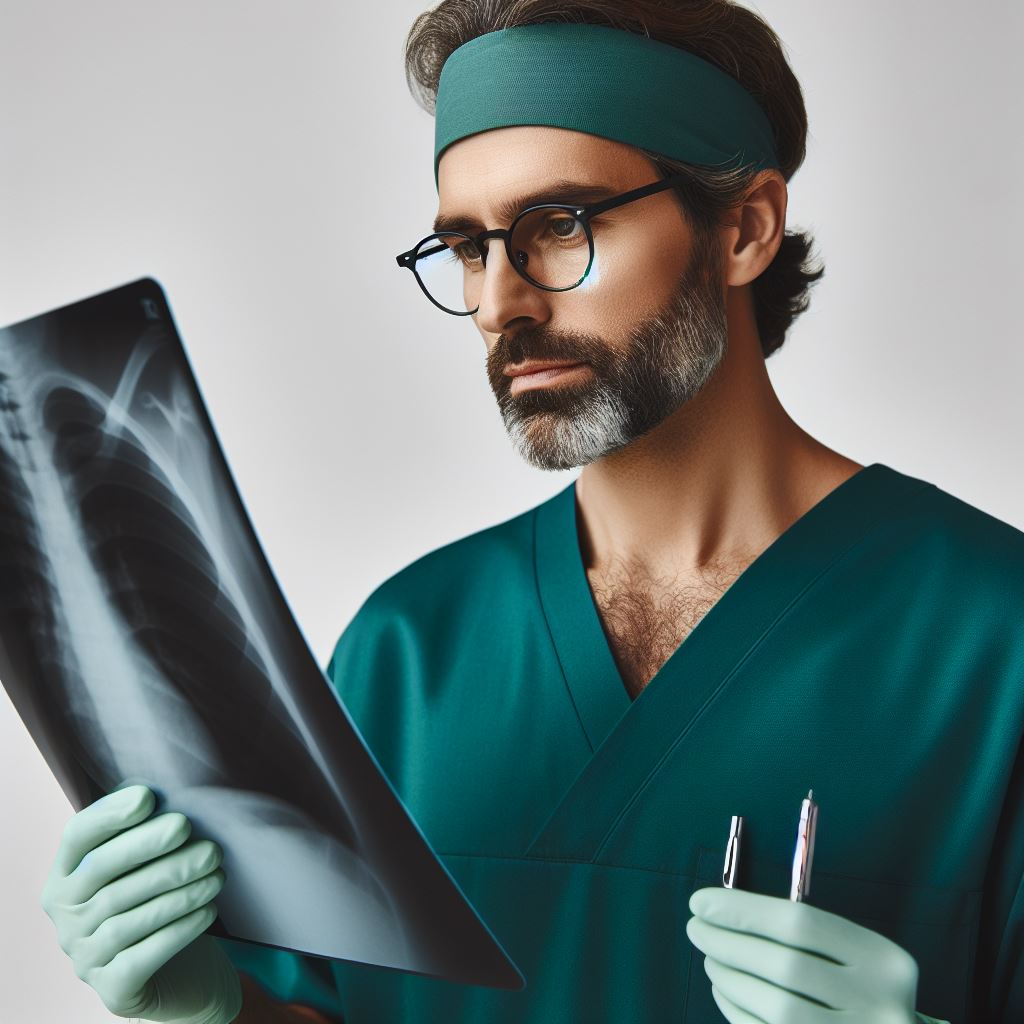Introduction
Choosing a specialty in the medical field is crucial for career success. Surgeon specialties provide a diverse range of options for medical professionals.
The purpose of this blog post is to provide an overview of surgeon specialties and their importance.
Importance of choosing a specialty in the medical field
Choosing a specialty allows surgeons to focus and hone their skills in a specific area. Specialties offer opportunities for greater expertise and advanced patient care.
Surgeons who specialize often have better job prospects and earning potential.
Overview of surgeon specialties
Cardiothoracic surgery focuses on heart and lung procedures, such as bypass surgeries. Orthopedic surgery specializes in conditions of the musculoskeletal system, like joint replacements.
Neurosurgery deals with the brain and nervous system, treating tumors and traumatic injuries. Plastic surgery involves reconstruction or alteration of the body, including cosmetic procedures.
Purpose of the blog post
This blog post aims to help aspiring surgeons understand the various specialties available. It provides insight into the benefits and challenges of choosing a specific surgical field.
By exploring different surgeon specialties, readers can make informed decisions about their future careers.
Basically, choosing a specialty in the medical field is crucial for surgeons to excel in their careers. Surgeon specialties offer opportunities for focused expertise, advanced patient care, and better job prospects.
This blog post aims to provide an overview of various surgeon specialties, helping readers make informed decisions about their future career paths.
General Surgeon
Definition and scope of practice
General surgeons are medical professionals who specialize in performing surgical procedures on various parts of the body excluding the brain and heart.
A general surgeon is a medical professional who specializes in performing surgical procedures on patients.
While their focus is on non-cardiac and non-neurological surgeries, they can operate on various parts of the body.
General surgeons have a broad scope of practice, allowing them to perform surgeries on organs such as the gastrointestinal tract, liver, gallbladder, and appendix.
They also perform procedures related to the breast, skin, and soft tissues.
Duties and responsibilities
General surgeons diagnose patients, perform surgeries, and provide pre and post-operative care.
They also collaborate with other healthcare professionals to ensure optimal patient outcomes.
General surgeons have several duties and responsibilities.
They evaluate patients’ conditions and determine the need for surgery.
Once surgery is deemed necessary, they perform the procedure using appropriate surgical techniques and tools.
General surgeons also provide pre-operative care by assessing patients’ overall health and ordering necessary tests.
They take responsibility for the patient’s safety during the surgical procedure and provide post-operative care and follow-up to ensure proper healing and recovery.
Training and education requirements
Becoming a general surgeon requires a bachelor’s degree, followed by four years of medical school.
After that, aspiring surgeons must complete a 5-year surgical residency program.
Becoming a general surgeon requires extensive education and training.
After completing a bachelor’s degree, individuals must attend medical school, which typically takes four years.
Following medical school, aspiring surgeons must complete a 5-year surgical residency program.
During this residency, they receive hands-on training in various surgical procedures, under the guidance of experienced surgeons.
Some general surgeons may also choose to specialize further by completing fellowships in subspecialties such as pediatric surgery or trauma surgery.
Career opportunities and job outlook
General surgeons can find job opportunities in hospitals, clinics, and private practice.
The job outlook for general surgeons is expected to grow steadily in the coming years.
General surgeons have a range of career opportunities available to them.
They can work in hospitals, clinics, or private practices.
Some surgeons may choose to practice in rural areas to serve underserved populations.
The demand for general surgeons is expected to increase due to a growing aging population and advancements in medical technology.
The job outlook for general surgeons is promising, with a projected growth rate that matches the average for all occupations.
Skills and qualifications needed
To be a successful general surgeon, one must possess excellent communication and problem-solving skills. Attention to detail and physical stamina are also crucial in this profession.
To succeed as a general surgeon, individuals need specific skills and qualifications.
Strong communication skills are essential for interacting with patients, their families, and other healthcare professionals.
General surgeons must possess excellent problem-solving abilities to diagnose conditions accurately and determine the most suitable treatment plan.
Attention to detail is crucial during surgeries to ensure precision and minimize complications.
Physical stamina is also necessary as surgeries can be physically demanding.
Additionally, general surgeons must stay updated with the latest medical advancements and techniques through continuing education and professional development.
Read: Navigating Healthcare Policies: An Admin’s Guide
Orthopedic Surgeon
Definition and scope of practice
An orthopedic surgeon is a medical professional who specializes in the treatment of musculoskeletal system disorders.
They diagnose, treat, and perform surgeries on conditions affecting the bones, joints, muscles, ligaments, tendons, and nerves.
Specialization in bone and joint surgery
Orthopedic surgeons focus on various areas within the field, including bone fractures, joint replacements, sports injuries, spinal disorders, pediatric orthopedics, and orthopedic oncology.
Common procedures and treatments performed
Some of the common procedures performed by orthopedic surgeons include joint replacements (such as knee and hip replacements), fracture repairs, arthroscopic surgeries, spinal fusion, and ligament repairs.
Your Personalized Career Strategy
Unlock your potential with tailored career consulting. Get clear, actionable steps designed for your success. Start now!
Get StartedTraining and education requirements
Becoming an orthopedic surgeon requires extensive education and training.
After completing a bachelor’s degree, aspiring orthopedic surgeons must complete four years of medical school, followed by a five-year residency program in orthopedic surgery.
Career opportunities and job outlook
Orthopedic surgery offers promising career opportunities.
As the population ages, the demand for orthopedic surgeons is expected to increase, especially in the areas of joint replacements and orthopedic trauma.
Skills and qualifications needed
Orthopedic surgeons need excellent manual dexterity, physical stamina, and problem-solving skills.
Additionally, they must possess good communication skills to interact with patients and work effectively with other healthcare professionals.
Overall, orthopedic surgery provides a wide range of opportunities for those interested in this specialty.
As an orthopedic surgeon, individuals have the chance to make a significant impact on patients’ lives by restoring mobility, relieving pain, and improving the overall quality of life.
With advancements in technology and surgical techniques, the field of orthopedic surgery continues to evolve, offering exciting prospects for the future.
Whether it’s treating professional athletes with sports injuries or helping elderly patients regain their independence, orthopedic surgeons play a vital role in the healthcare system.
Read: Emergency Scenes: Aussie Paramedics’ Challenges

Cardiothoracic Surgeon
Definition and scope of practice
A cardiothoracic surgeon specializes in surgical procedures involving the heart and thoracic (chest) cavity.
Specialization in heart and lung surgery
Cardiothoracic surgeons focus on treating diseases and conditions related to the heart, lungs, and other thoracic organs.
Common procedures and treatments performed
- Coronary artery bypass grafting (CABG) to improve blood flow to the heart.
- Heart valve repair or replacement to treat valvular diseases.
- Lung cancer surgery, including lobectomy or pneumonectomy.
- Thoracic aortic aneurysm repair to prevent life-threatening complications.
- Heart transplant and ventricular assist device (VAD) implantation for end-stage heart failure.
Training and education requirements
Cardiothoracic surgeons undergo extensive education and training, typically including:
- Earning a Bachelor’s degree
- Graduating from medical school
- Completing a surgical residency program
- Completing a cardiothoracic surgery fellowship program
Career opportunities and job outlook
Cardiothoracic surgeons have a range of career opportunities in both academic settings and private practice.
A career as a cardiothoracic surgeon is demanding but rewarding.
These professionals play a critical role in saving and improving lives. With advancements in technology and research, the field of cardiothoracic surgery continues to evolve, offering new treatment options for patients.
As a cardiothoracic surgeon, you will have the opportunity to work in a variety of settings, including hospitals, clinics, and research institutions.
You may also have the chance to collaborate with other medical specialists, such as cardiologists and pulmonologists, to provide comprehensive care to patients.
Skills and qualifications needed
- Excellent manual dexterity and hand-eye coordination
- Strong problem-solving and decision-making skills
- Ability to handle high-stress situations
- Effective communication with patients, families, and other healthcare professionals
In addition to the technical skills required to perform complex surgeries, cardiothoracic surgeons must also possess strong interpersonal skills.
Building trust and rapport with patients is crucial in managing their preoperative and postoperative care.
Compassion and empathy are essential qualities for providing optimal patient outcomes.
It is important to note that becoming a cardiothoracic surgeon requires a significant time commitment.
The rigorous training and educational requirements can take up to 10-15 years to complete.
However, the financial rewards and personal fulfillment that come with the profession make it a worthwhile pursuit for those dedicated to helping others and making a positive impact in the field of healthcare.
In general, cardiothoracic surgery offers a specialized and challenging career path for aspiring surgeons.
The ability to treat and improve the lives of patients with heart and lung diseases makes this field rewarding.
If you have a passion for surgery and want to make a difference in the lives of others, becoming a cardiothoracic surgeon may be the right choice for you.
Read: Aussie Paramedic Salaries: Expectations vs. Reality
Uncover the Details: Public Health Outreach: Stories from Oz
Stand Out with a Resume That Gets Results
Your career is worth more than a generic template. Let us craft a resume and cover letter that showcase your unique strengths and help you secure that dream job.
Get HiredNeurosurgeon
Definition and scope of practice
A neurosurgeon is a specialized surgeon who treats disorders and diseases of the nervous system.
Neurosurgeons are highly specialized medical professionals who focus on diagnosing and treating disorders and diseases related to the nervous system.
They perform surgeries to address conditions affecting the brain, spine, and nerves.
Their valuable expertise and skills make them an essential part of the medical field.
If you’re interested in becoming a neurosurgeon, it’s essential to understand the definition, scope of practice, and requirements for this career path.
Specialization in the nervous system and brain surgery
Neurosurgeons focus on the diagnosis, surgical treatment, and management of conditions affecting the brain, spine, and nerves.
Neurosurgeons primarily specialize in the diagnosis, surgical treatment, and management of conditions affecting the nervous system.
This intricate and complex field of medicine requires a deep understanding of the brain, spine, and nerves, as well as the ability to perform delicate surgical procedures with precision.
Common procedures and treatments performed
Neurosurgeons perform intricate procedures such as brain tumor removal, spinal fusion, and deep brain stimulation.
Some of the common procedures and treatments neurosurgeons perform include brain tumor removal, spinal fusion, and deep brain stimulation.
These surgeries aim to alleviate symptoms, improve quality of life, and potentially save lives.
Training and education requirements
Becoming a neurosurgeon requires rigorous education, including a bachelor’s degree, medical school, and a neurosurgery residency program.
To become a neurosurgeon, extensive training and education are required. Aspiring neurosurgeons must complete a bachelor’s degree, followed by medical school.
After getting a medical degree, they must then complete a residency in neurosurgery, which typically lasts around seven years.
Career opportunities and job outlook
Neurosurgeons have promising career prospects, with a projected growth rate of 14% from 2018 to 2028.
Once the extensive training is complete, neurosurgeons have various career opportunities available to them. They can work in hospitals, private practices, or even pursue academic positions.
Neurosurgery is a demanding field, but the job outlook is promising, with a projected growth rate of 14% from 2018 to 2028.
Skills and qualifications needed
Neurosurgeons must possess exceptional dexterity, critical thinking abilities, and strong communication skills.
In addition to their educational background and technical skills, neurosurgeons must possess other important qualities. Excellent hand-eye coordination, exceptional dexterity, and precise motor skills are essential for successfully performing intricate surgical procedures.
Moreover, neurosurgeons need to have sharp critical thinking abilities. They must accurately diagnose patients, evaluate treatment options, and make informed decisions under pressure.
Transform Your LinkedIn for Maximum Impact
Elevate your professional brand with a LinkedIn profile that attracts recruiters, showcases your expertise, and maximizes opportunities. Stand out in your industry with a profile built for success.
Boost ProfileLastly, strong communication skills are crucial. Neurosurgeons must effectively communicate with patients and their families to provide guidance, answer questions, and ease concerns throughout the treatment process.
Ultimately, neurosurgery is a highly specialized field within the medical profession that focuses on the diagnosis and surgical treatment of conditions affecting the nervous system.
With rigorous training and education, neurosurgeons acquire the skills necessary to perform complex procedures and provide essential care to patients.
The demand for neurosurgeons is expected to increase in the coming years, making it a promising career choice for those interested in medicine and the intricacies of the human brain.
Read: Top Skills Needed for Paramedics Down Under
Uncover the Details: Essential Skills for Aussie Health Workers
Plastic Surgeon
A plastic surgeon is a specialist in aesthetic and reconstructive surgery. They perform various procedures and treatments to enhance appearance and restore function.
Definition and Scope of Practice
- Plastic surgeons are medical professionals who specialize in altering and reconstructing the human body.
- Their scope of practice includes both cosmetic and reconstructive surgery.
- They work with patients of all ages, helping them achieve their desired aesthetic goals or restoring normal functioning after injury, illness, or congenital defects.
Specialization in Aesthetic and Reconstructive Surgery
- A plastic surgeon can choose to specialize in either aesthetic or reconstructive surgery or both.
- In aesthetic surgery, they enhance the appearance of various body parts, such as the face, breasts, or abdomen, through procedures like facelifts, breast augmentations, or tummy tucks.
- In reconstructive surgery, they restore form and function to body parts affected by trauma, disease, or birth defects. Examples include breast reconstruction after mastectomy or repairing facial injuries.
Common Procedures and Treatments Performed
- Plastic surgeons perform a wide range of procedures and treatments, depending on the patient’s needs and goals.
- Common aesthetic procedures include rhinoplasty (nose job), liposuction, breast reduction, and facial rejuvenation techniques like Botox or dermal fillers.
- Reconstructive procedures can involve scar revision, cleft lip and palate repairs, tissue transplantation, and burn reconstruction.
Training and Education Requirements
- Becoming a plastic surgeon requires extensive education and training.
- After completing a bachelor’s degree, aspiring surgeons must attend medical school and earn a Doctor of Medicine (M.D.) or Doctor of Osteopathic Medicine (D.O.) degree.
- Following medical school, they undertake a comprehensive residency program in plastic surgery, typically lasting around six to eight years.
- After residency, some plastic surgeons may choose to pursue additional fellowship training in specific areas like hand surgery or microsurgery.
Career Opportunities and Job Outlook
- Plastic surgeons can find employment in various settings, including hospitals, private clinics, or academic institutions.
- They may also choose to establish their own practices or join existing surgical groups.
- The demand for plastic surgeons is expected to grow, driven by an increased emphasis on aesthetics and advancements in reconstructive techniques.
- Job opportunities are also influenced by geographic location and personal reputation.
Skills and Qualifications Needed
- Plastic surgeons require exceptional surgical skills, attention to detail, and artistic abilities.
- Good communication skills are vital for establishing rapport with patients and understanding their expectations and concerns.
- They must keep up with the latest advancements in surgical techniques and stay abreast of developments in cosmetic products and technologies.
- Plastic surgeons must also possess strong ethical values and prioritize patient safety and satisfaction.
Most importantly, plastic surgery is a specialized field with diverse career opportunities.
The expertise of plastic surgeons in both aesthetic and reconstructive surgery helps individuals achieve their desired appearance and regain confidence in their bodies.
Delve into the Subject: Public Health vs. Clinical Care in Australia
Conclusion
Concluding our exploration of surgeon specialties unveils a rich tapestry of medical domains, each playing a crucial role.
From orthopedic surgeons mending bones to neurosurgeons navigating intricate neurological landscapes, the choices are diverse.
As individuals embark on the journey of choosing a surgical specialty, it becomes paramount to introspect, evaluating personal interests and skills.
Aligning passion with profession is the cornerstone of a rewarding surgical career.
The multifaceted nature of surgical specialties necessitates a thorough examination before making life-altering decisions.
It’s an invitation to delve deeper into the intricacies of each specialty, understanding the challenges, rewards, and unique contributions they offer.
Beyond the scalpel and operating room, surgeons shape the landscape of healthcare, making significant contributions to the well-being of patients.
As readers navigate the spectrum of surgeon specialties, I encourage them to envision themselves in these roles.
This introspection, combined with detailed research, ensures a well-informed decision—one that resonates with individual aspirations, aligning passion with the noble pursuit of healing.
The future of surgery lies in the hands of those who carefully choose their path, contributing to the evolving narrative of medical excellence.




